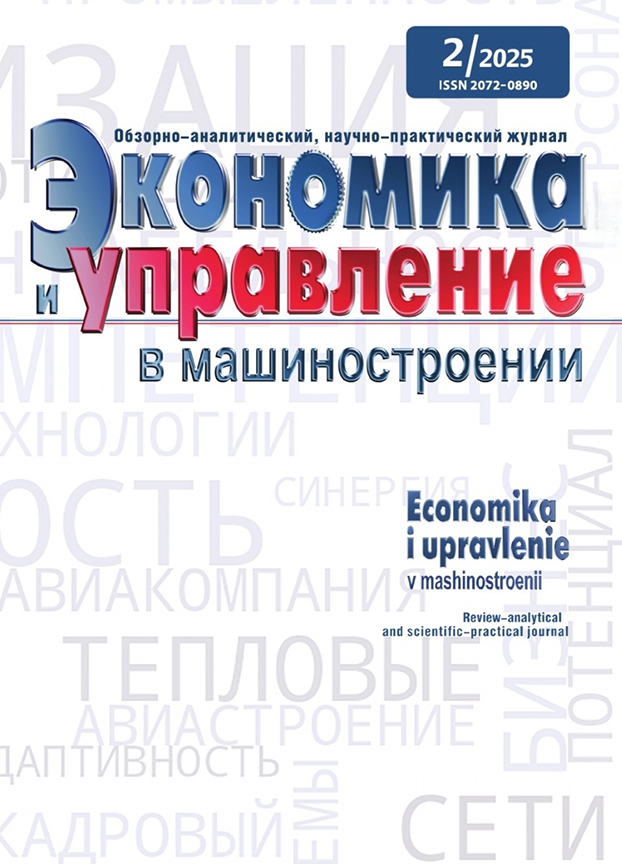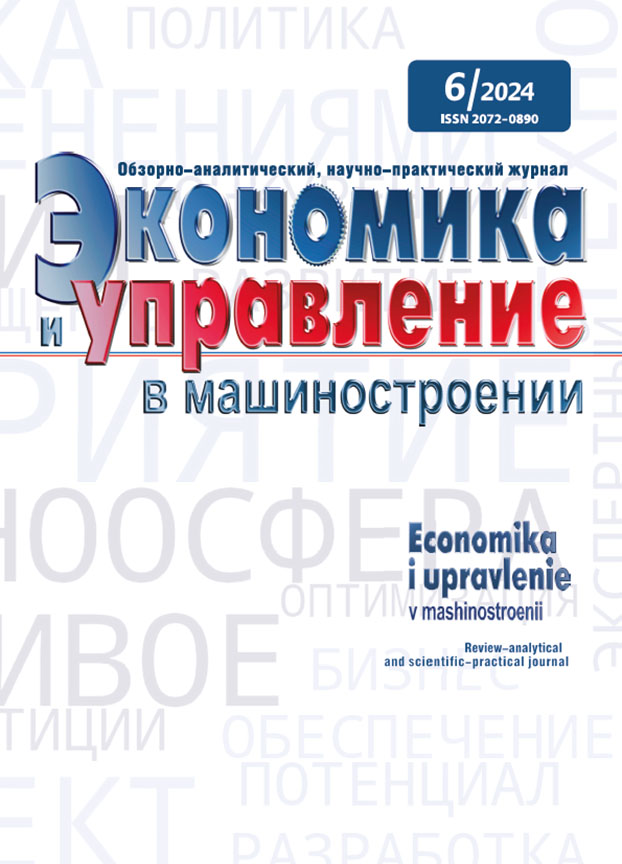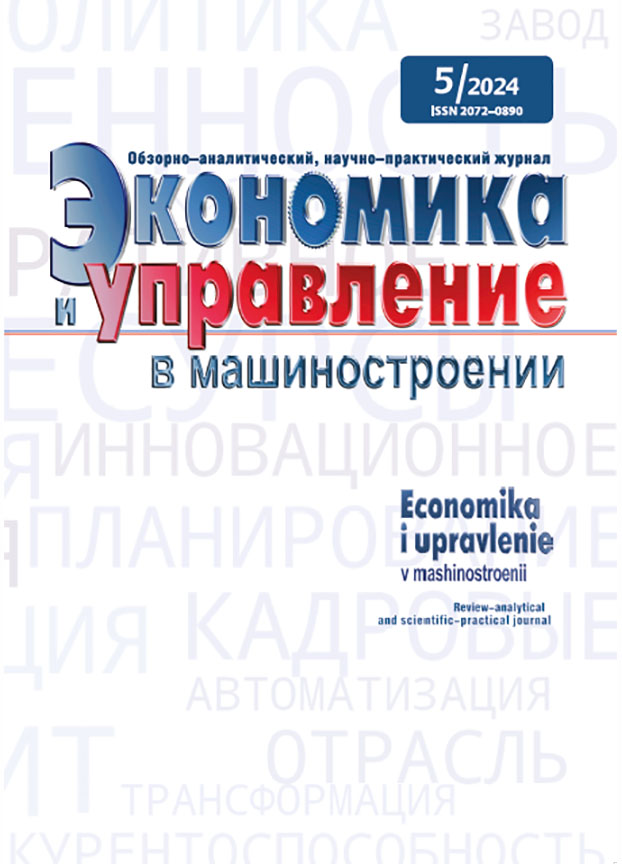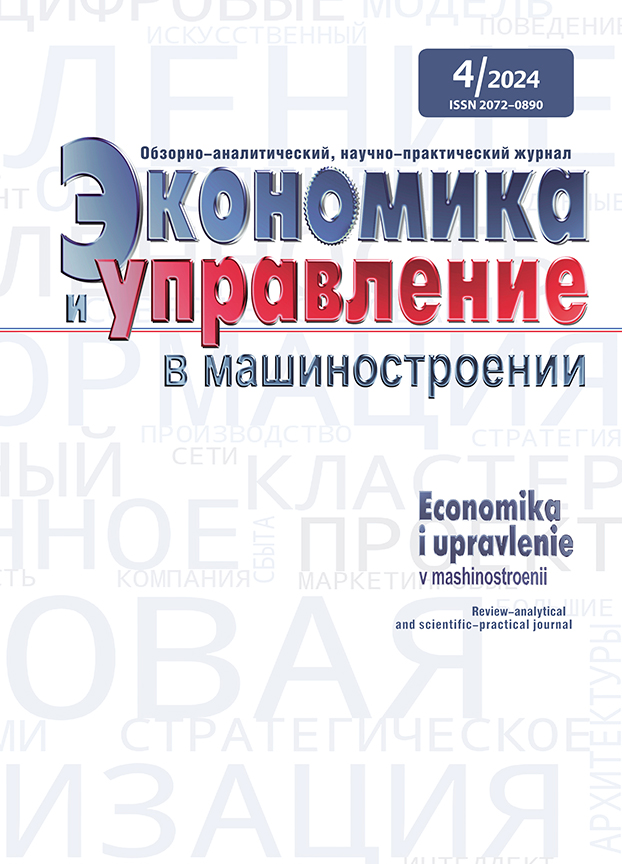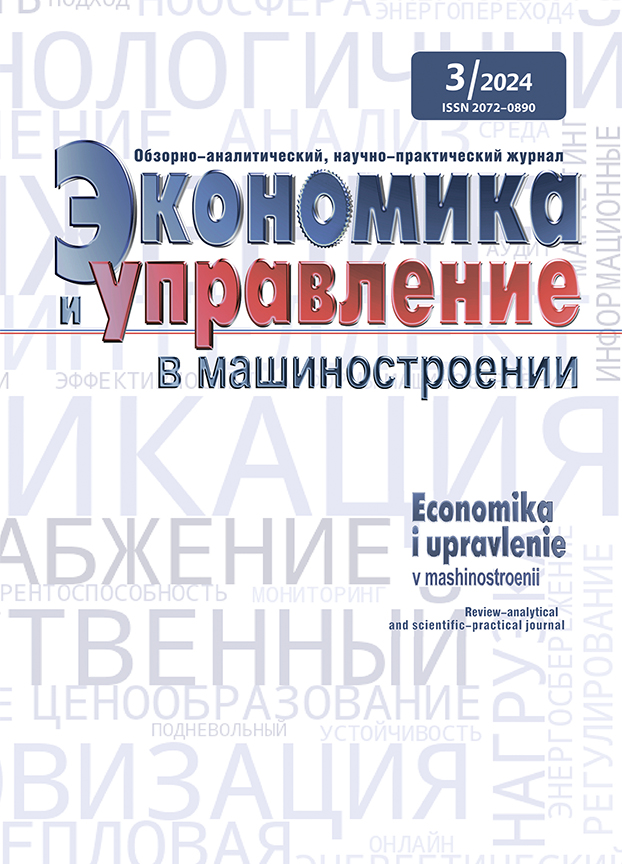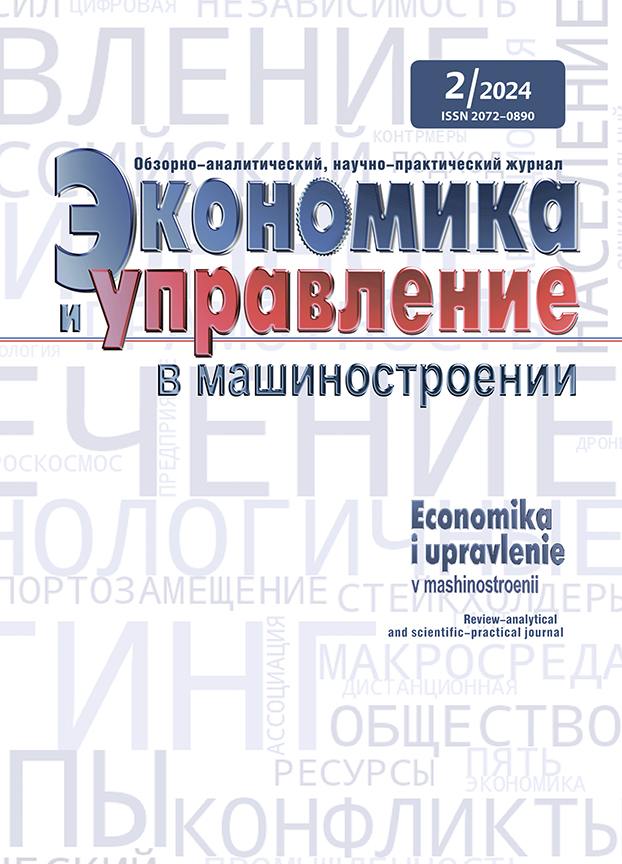OPERATION OF BUSINESS, INDUSTRIAL ENGINEERING
Integrated inventory control system as a way to reduce expenditures and rise profitability
Kaibeleva V. R., postgraduate student at the Management and marketing of high-tech industries Department
Moscow Aviation Institute (National Research University), Moscow
Mezina N. A., candidate of Economic sciences, associate professor at the Management and marketing of high-tech industries Department
Moscow Aviation Institute (National Research University), Moscow
Abstract: The article discusses the concept of an integrated inventory control system (ICS) as a strategic tool for optimizing logistics processes, reducing costs and increasing the profitability of an enterprise. The key advantages of implementing ICS are analyzed including improvement of the accuracy of demand forecasting, optimization of the inventory levels, reduction of the storage and transportation costs, and improvement of the customer service. Special attention is paid to the integration of ICS with other corporate systems such as ERP, CRM and SCM to ensure end-to-end transparency and effective management of the entire supply chain. Examples of successful implementation of ICSs and a quantitative assessment of the economic benefits received are given. In conclusion, the article emphasizes that the ICS is a prerequisite for maintaining competitiveness in today’s dynamic business environment.
Keywords: integrated inventory control system, inventory management, ERP, CRM, SCM, cost reduction, profitability improvement, logistics, automation, business processes, competitiveness
Prerequisites for transformation of the production system of an industrial enterprise in the context of formation of the digital economy in the Russian Federation
Maiorova K. S., candidate of Economic sciences, associate professor at the of Innovative economics Department
State Marine Technical University (SMTU), St. Petersburg
Abstract: In the current reality, modern production systems of industrial enterprises, which are leaders of the Russian market, face significant financial losses for various reasons, even though they have a powerful infrastructure and sufficient resources. This fact indicates the need for a rapid revision of development strategies, methods for building production and business processes, as well as approaches to the formation and functioning of production systems. The widespread digitalization and formation of the digital economy of the Russian Federation also initiate the processes of introducing innovative technologies and products into the activities of leading enterprises in various sectors of the economy. Updated Russian strategic programs and initiatives form a key aspect on which it is necessary to focus attention, namely, the achievement of the technological sovereignty of the Russian Federation from international markets. In this regard, this study considers the prerequisites for the digital transformation of production systems of industrial enterprises of the Russian Federation in modern conditions.
Keywords: industry, digitalization, transformation, production system, digital economy, digital technology
INNOVATIVE INVESTMENT ACTIVITY
Assessment of the multiplicative impact of digital transformation projects for manufacturing industries in the sphere of activity of the Russian Federal Ministry of Industry and Trade
Daraselia L. Sh., first deputy general director
Digital industrial technologies, Moscow
Dozhdyov V. S., director of the of Digital technology Department
Ministry of Industry and Trade of the Russian Federation (Minpromtorg), Moscow
Malakhov A. A., expert analyst
Digital industrial technologies, Moscow
Stepanova A. Ye., leading researcher
Digital industrial technologies, Moscow
Shantaev E. B., CEO
Digital industrial technologies, Moscow
Abstract: Science and technology are the main drivers of national development, enabling us to change the global innovation ecosystem by consistently responding to the challenges facing our country. Promoting the structural transformation of the Russian economy has never been more important than it is today. The article substantiates the need to assess critically the readiness for practical implementation of digital transformation projects in the manufacturing sector. The authors present a mechanism for assessing the technical readiness of the described projects in the form of a formula. They suggest an algorithm to identify the key areas where digitalization can have the greatest impact. Business processes that can be excluded from digital transformation are also outlined. Authors suggest their own vision of the «digital transformation manifesto» that companies can adopt to support digital transformation processes.
Keywords:digital transformation, «digital maturity» of industrial companies, technological sovereignty, technological leadership
About role of manpower’s digital characteristics in transformation of machine building production architecture
Sokur A. V., candidate of Economic sciences, associate professor at the Center for educational Engineering
Yugra state university, Khanty-Mansiysk
Mishchenko V. A., doctor of Pedagogical sciences, associate professor at the Higher psychological and pedagogical School
Yugra state university, Khanty-Mansiysk
Abstract: The article substantiates the role of digital qualities of human capital in the transformation of the architecture of mechanical engineering production. The article examines modern aspects of the development of mechanical engineering production due to the introduction of digital services and technologies. It is argued that digital transformation requires employees to master new digital skills. The concept of digital competence as the ability to competently and meaningfully apply digital technologies and software to analyze data and create new knowledge has been expanded. The factors important for understanding the role of digital competence in the formation of a new quality of human capital are identified. In particular, the importance of continuous learning throughout life is substantiated, which allows transforming information into innovative solutions through analytical and creative application of technologies, ensuring human stability in the face of permanent change.
Keywords: human capital, digital competencies, digitalization, innovative development, industrial development
ENERGY SAVING AND ENERGY EFFICIENCY
From traditional networks to smart ones: economic consequences of modernization of heating networks
Babich B. P., postgraduate student at the Management and marketing of high-tech industries Department1, leading specialist at the General Directorate2
1 – Moscow Aviation Institute (National Research University), Moscow
2 – PJSC Mosenergo, Moscow
Pushkareva M. B., candidate of Economic sciences, associate professor at the Management and marketing of high-tech industries Department
Moscow Aviation Institute (National Research University), Moscow
Solntsev Yu. V., researcher
Moscow scientific and practical center of dermatology and cosmetology, Moscow
Abstract: The article is devoted to the analysis of the transition from traditional heating networks to smart systems in Moscow and the Moscow region. The current problems of the existing infrastructure are considered: high heat losses, wear and tear of equipment and networks, frequent accidents. The study also examines the state-of-art modernization technologies, digital monitoring systems, and automated control systems that aim to increase network stability, reduce energy losses, and operating costs. The economic effect of the introduction of innovations is estimated: reduction of thermal energy losses by 20–30 %. The paper considers the need for accelerated digitalization of heat supply to improve the energy efficiency of the megalopolis and public-private partnerships for technology scaling.
Keywords: smart heating networks, modernization, economic efficiency, digitalization, operating costs, heat losses, public-private partnership
QUALITY PRODUCTION, COMPETITIVENESS
Digital technologies and Agile methodologies: synergy for improving business processes in high-tech enterprises
Sumerkin M. Yu., postgraduate student at the Management and marketing of high-tech industries Department
Moscow Aviation Institute (National Research University), Moscow
Koshelev A. S., candidate of Economic sciences, senior lecturer at the Management and marketing of high-tech industries Department
Moscow Aviation Institute (National Research University), Moscow
Prokofiev D. A., candidate of Economic sciences, associate professor at the Management and marketing of high-tech industries Department
Moscow Aviation Institute (National Research University), Moscow
Abstract: The paper considers the issues of digital transformation of high-tech enterprises and the use of Agile methodologies to improve business processes. The impact of digital technologies such as artificial intelligence, cloud computing, big data, the Internet of Things and automation on production processes and enterprise efficiency is analyzed. The dynamics of the introduction of Agile methodologies in industry is investigated. The synergistic effects of combining Agile and digital technologies are evaluated, allowing to shorten production cycles, reduce costs, increase labor productivity and improve the adaptability of companies to changing market conditions. The work focuses on the study of digital transformation in the context of regional and sectoral economics and provides recommendations on the use of Agile in high-tech companies.
Keywords: digital technologies, Agile methodologies, digital transformation, artificial intelligence, big data, automation, Internet of things, cloud computing, business processes, productivity, efficiency, flexible management, synergy, regional economy, industry development, industry, high-tech enterprises, adaptability, economic efficiency, competitiveness
EDUCATION AND PERSONNEL TRAINING
Analyzing current status and dynamics of economic literacy in Russian society
Golov R. S., doctor of Economic sciences, head of the Management and marketing of high-tech industries Department
Moscow Aviation Institute (National Research University), Moscow
Abstract: This article presents assessments of the economic literacy of participants in the eighth nationwide educational initiative The All-Russian Economic Dictation held in 2024. The analysis of performance of the dictation audience is conducted based on various criteria including gender, age of participants, their level of education, among others. The results obtained are compared with those from the initiative that took place in 2023.
Keywords: economy, society, educational initiative, All-Russian economic dictation, economic literacy, assessment of economic literacy, economic competencies
Certification as an instrument to manage manpower potential of an air carrier
Permyakov P. Yu., postgraduate student at the Management and marketing of high-tech industries Department
Moscow Aviation Institute (National Research University), Moscow
Putyatina L. M., doctor of Economic sciences, professor at the Management and marketing of high-tech industries Department
Moscow Aviation Institute (National Research University), Moscow
Abstract: This article examines the specific features and requirements for certification of personnel in the aviation industry, including strict regulatory standards, high requirements for the health of pilots and the need for continuous training. The analysis of the certification methodology is carried out, and the current problems and challenges that aviation companies face in the certification process are also touched upon.
In recent years, priorities in the field of personnel management have changed and the concept of “human capital” has strengthened, which allows us to regard a person as a valuable resource that due to the qualifications, knowledge, skills, abilities and personal qualities of an employee allows us to achieve the company’s goals. Therefore, at present, with the rapid development of new technologies and increasing globalization, the requirements for employees have become more complex, and many managers have realized that the personnel of any organization is an important factor in success. For the rational use of human capital, it is necessary to be able to correctly determine what it is. One of such tools is personnel certification.
Keywords: personnel certification, human resources, training, motivation, airline, qualification
FOREIGN EXPERIENCE
International experience in creating an energy efficient digital environment in high-tech industrial enterprises
Pushkarev M. D., postgraduate student at the Management and marketing of high-tech industries Department
Moscow Aviation Institute (National Research University), Moscow
Putyatina L. M., doctor of Economic sciences, professor at the Management and marketing of high-tech industries Department
Moscow Aviation Institute (National Research University), Moscow
Abstract: The article examines the international experience of creating an energy-efficient digital environment in high-tech industrial enterprises. The authors analyze the basic principles of digitalization applied in various countries and their impact on energy efficiency. Innovative technologies and methodologies contributing to the optimization of production processes are discussed, as well as successful examples of the introduction of digital solutions in the energy sector. This implementation results in reduction of energy consumption and increase in the overall competitiveness of enterprises.
Keywords: energy efficiency, digital environment, high-tech enterprises, industry, transformation
Achievement of the balance in high-tech industry. A case of the Samsung Electronics Co. Part 1
Movsesyan R. S., postgraduate student at the Management and marketing of high-tech industries Department
Moscow Aviation Institute (National Research University), Moscow
Smirnov V. G., doctor of Economic sciences, professor at the Management and marketing of high-tech industries Department
Moscow Aviation Institute (National Research University), Moscow
Abstract: The article describes the evolution and the achievement of outstanding success of a well-known multinational company in the field of electronics, mobile technologies and innovations Samsung Electronics Co. Over its more than 80-year history, the company has proven that it can be a leader in a wide variety of fields and is not going to give up these positions. Today, Samsung is one of the largest and most expensive corporations in the world.
Along with technical achievements and successful sales, Samsung is able to achieve balance in various aspects of its business. The company successfully maintains a balance between innovation, market competitiveness and social responsibility. This article examines the key aspects that allow the company to achieve balance and to cope with the challenges of the modern market.
Keywords: evolution of the Samsung company, achievement of outstanding success, leader, balance in various aspects of business
ANALYTICAL RESEARCH
Risk resistance of machine-building companies against the global challenges of 2020– 2025 in terms of sovereignty
Silakova V. V., doctor of Economic sciences, professor at the Production organization Department1, professor at the Urban and service economy Department2
1 – Russian State Agrarian University – Moscow Timiryazev Agricultural Academy, Moscow
2 – Moscow University named after S. Yu. Vitte, Moscow
Abstract: Mechanical engineering is a strategically important industry where effective risk management requires a combination of statistical data, analytical methods and flexible strategic planning. The article is devoted to analyzing both a role of mechanical engineering in the Russian economy, which provides technological sovereignty and development of related sectors (energy, defense industry, agriculture), and the methods of strategic risk management in the conditions of modern challenges.
Keywords: mechanical engineering, risk assessment methods, risk management, economic strategies, strategic method, analysis

